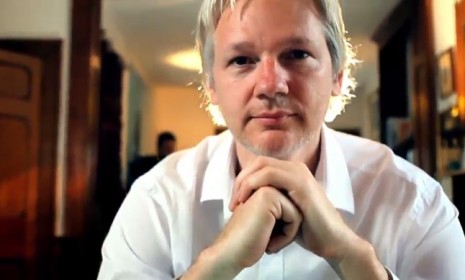Julian Assange's talk show debut: A major letdown?
The WikiLeaks founder launches The World Tomorrow on Russia's RT network. But despite having a high-profile first guest, Assange didn't exactly impress

A free daily email with the biggest news stories of the day – and the best features from TheWeek.com
You are now subscribed
Your newsletter sign-up was successful
Julian Assange, once labeled "the world's most famous whistleblower," is now an aspiring talk-show star. On Tuesday, the founder of WikiLeaks debuted his new talk show The World Tomorrow on RT, Russia's state-controlled news network and website. (Watch the video below.) Because Assange is under house arrest and facing extradition to Sweden on rape and molestation charges, he conducted the interview with his first guest, Hezbollah leader Hassan Nasrallah, from his British countryside estate via video chat. (Nasrallah spoke from an undisclosed location in Lebanon.) In a press release, Assange promised that The World Tomorrow, which is slated for 11 weekly episodes, will capture and present a "revolutionary spirit to a global audience." Did the premiere live up to its own hype?
The show is awful: Assange teased that his first guest would be "particularly controversial" and "highly charismatic," says Joe Coscarelli at New York, but that was clearly an oversell. The conversation with Nasrallah was not particularly revealing, and having two translators speak over everyone was incredibly distracting. The embarrassingly chintzy production value gave the whole affair a "public access plus Skype" vibe. The interview seemed better suited for a podcast than a television show.
"Julian Assange's talk show is yet another WikiLeaks letdown"
The Week
Escape your echo chamber. Get the facts behind the news, plus analysis from multiple perspectives.

Sign up for The Week's Free Newsletters
From our morning news briefing to a weekly Good News Newsletter, get the best of The Week delivered directly to your inbox.
From our morning news briefing to a weekly Good News Newsletter, get the best of The Week delivered directly to your inbox.
But the newsy guests make it worthwhile: Yes, the production was a "pretty spartan affair," and the interview wasn't particularly penetrating, says Joshua Keating at Foreign Policy. But the significance of Assange booking Nasrallah, who hasn't given an interview in more than six years, shouldn't be underestimated. That coup alone makes The World Tomorrow worth watching. If Assange continues to attract guests "who would never go near a mainstream journalist with a ten-foot poll," then the show will quickly become a must-watch.
Assange is just the Kremlin's pawn: "The most insidious aspect of the show" isn't Assange's stilted delivery or his softball line of questioning, says Luke Harding at Britain's Guardian. It's that he has agreed to air it on RT, which is Kremlin-controlled and infamous for its propaganda-like lack of reporting on the country's corruption in favor of shiny depictions of a thriving Russia. Why would Assange "agree to become a pawn in the Kremlin's global information war?" Perhaps he needs the money. Perhaps no one else would have him. But joining RT's payroll "confirms he is no fearless revolutionary."
"The World Tomorrow: Julian Assange proves a useful idiot"
A free daily email with the biggest news stories of the day – and the best features from TheWeek.com
-
 Film reviews: ‘Wuthering Heights,’ ‘Good Luck, Have Fun, Don’t Die,’ and ‘Sirat’
Film reviews: ‘Wuthering Heights,’ ‘Good Luck, Have Fun, Don’t Die,’ and ‘Sirat’Feature An inconvenient love torments a would-be couple, a gonzo time traveler seeks to save humanity from AI, and a father’s desperate search goes deeply sideways
-
 Political cartoons for February 16
Political cartoons for February 16Cartoons Monday’s political cartoons include President's Day, a valentine from the Epstein files, and more
-
 Regent Hong Kong: a tranquil haven with a prime waterfront spot
Regent Hong Kong: a tranquil haven with a prime waterfront spotThe Week Recommends The trendy hotel recently underwent an extensive two-year revamp